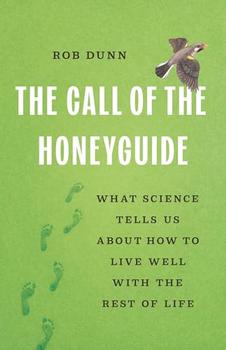
What Science Tells Us about How to Live Well with the Rest of Life
by Rob Dunn
How rethinking our relationships with other species can help us reimagine the future of humankind.
In the woodlands of sub-Saharan Africa, sometime deep in our species' past, something strange happened: a bird called out, not to warn others of human presence, but to call attention to herself. Having found a beehive, that bird—a honeyguide—sought human aid to break in. The behavior can seem almost miraculous: How would a bird come to think that people could help her? Isn't life simply bloodier than that?
As Rob Dunn argues in The Call of the Honeyguide, it isn't. Nature is red in tooth and claw, but in equal measure, life works together. Cells host even smaller life, wrapped in a web of mutual interdependence. Ants might go to war, but they also tend fungi, aphids, and even trees. And we humans work not just with honeyguides but with yeast, crops, and pets. Ecologists call these beneficial relationships mutualisms. And they might be the most important forces in the evolution of life.
We humans often act as though we are all alone, independent from the rest of life. As The Call of the Honeyguide shows, we are not. It is a call to action for a more beneficent, less lonely future.
Media reviews not yet available.
This information about The Call of the Honeyguide was first featured
in "The BookBrowse Review" - BookBrowse's membership magazine, and in our weekly "Publishing This Week" newsletter. Publication information is for the USA, and (unless stated otherwise) represents the first print edition. The reviews are necessarily limited to those that were available to us ahead of publication. If you are the publisher or author and feel that they do not properly reflect the range of media opinion now available, send us a message with the mainstream reviews that you would like to see added.
Any "Author Information" displayed below reflects the author's biography at the time this particular book was published.
Rob Dunn is an assistant professor in the department of zoology at the North Carolina State University, as well as an up-and-coming science popularizer. His work appears in Natural History, Scientific American, BBC Wildlife, and Seed magazines. He lives in Raleigh, North Carolina.
Finishing second in the Olympics gets you silver. Finishing second in politics gets you oblivion.
Click Here to find out who said this, as well as discovering other famous literary quotes!
Your guide toexceptional books
BookBrowse seeks out and recommends the best in contemporary fiction and nonfiction—books that not only engage and entertain but also deepen our understanding of ourselves and the world around us.